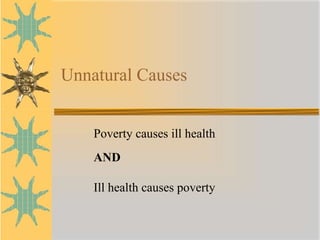Health Equity And Public Health Aiton2
- 1. Unnatural Causes Poverty causes ill health AND Ill health causes poverty
- 2. United States Spends more than twice the average of other industrialized countries yet has highest: Infant Mortality rate Homocide rate Child poverty rate Gap between high and low mortality rates in country Gap between rich and rest of the population
- 3. BARHII Framework The Bay Area Regional Health Inequities Initiative (BARHII) is a unique undertaking by local health departments in the San Francisco Bay Area to confront health inequities. All of the following slides are adopted from a presentation to NYSACHO by Anthony Iton, Director and Health Officer, Alameda County Public Health Department. May 2008.
- 4. Infant mortality Mortality Life expectancy
- 5. Chronic disease Infectious disease Injury (intentional and unintentional) Disease Access to and Mortality health care Injury 10-15% Genetics 10-15%
- 6. Smoking Medical Model Nutrition Physical activity Individual health Disease Risk knowledge and Mortality Behaviors Injury 70% ?? Violence
- 7. Physical environment Social environment Neighbor- Disease Risk hood and Mortality Behaviors Conditions Injury Residential segregation
- 8. ╠²
- 9. Schools Corporations and businesses Neighbor- Disease Institutional Risk hood and Mortality Power Behaviors Conditions Injury Government agencies
- 10. Race/ethnicity Class Gender Neighbor- Disease Social Institutional Risk hood and Mortality Inequalities Power Behaviors Conditions Injury Immigration status
- 11. Socio-Ecological (society) Medical Model (individuals) Diseased Biased Societal Community Behaviors Behavior Disease Death Decision Death Processes Comm. Policy Health Clinics Emergency Capacity Advocacy Education Rooms Building
- 12. ŌĆ£ Services Overkill?ŌĆØ How Government Human Service Agencies Behave $$ $$$$ $$$$$
- 13. Life Expectancy High school grads: 90% Unemployment: 4% Poverty: 7% >80 Home ownership: 64% Non-White: 49% High school grads: 81% Unemployment: 6% Poverty: 10% 74.3 - 80 Home ownership: 52% Non-White: 59% High school grads: 65% Unemployment: 12% <74.3 Poverty: 25% Home ownership: 38% Non-White: 89%
- 14. In Oakland, African American and Latino 7 th graders read below the level of White 3 rd graders 700 687 675 656 650 631 625 625 600 575 White 3rd Grade White 7th Grade Black 7th Grade Latino 7th Grade CAT/6 2005 Source: California Department of Education, http://data1.cde.ca.gov/dataquest/
- 15. Cost of Poverty in Alameda County ŌĆś Every additional $12,500 in household income buys one year of life expectancy ŌĆś (Benefit appears to plateau at household incomes above $150,000)
- 16. Results of the statistical comparison of weather and deaths over 12 years show that blacks and those with a high school education or less are most likely to die on extremely hot days. - Harvard School of Public Health study of almost 8 million deaths in 50 cities from 1989 to 2000.
- 17. Socio-Ecological Medical Model Bay Area Regional Health Inequities Initiative
- 18. ╠²
- 19. The Social Determinants of Health at the Neighborhood Level Physical Environment Social Environment Economic Environment Services Environment
- 20. Key Strategies for Enhancing the Social Environment ŌĆś Community capacity building - Organizing - Increases social capital/connectedness - Increases civic engagement ŌĆś Youth development - Risk vs. resiliency
- 21. Definitions Community Capacity Building/Empowerment ŌĆ£ Aims to strengthen characteristics of communities to plan, develop, implement & maintain effective community programs that positively affect broader community conditions that determine health and well beingŌĆØ -adapted from the W. K. Kellogg Foundation
- 22. HP 2010 Healthy People 2010 recognizes that communities, States, and national organizations will need to take a multidisciplinary approach to achieving health equityŌĆöan approach that involves improving health, education, housing, labor, justice, transportation, agriculture, and the environment.
- 23. Unnatural Causes: Is Inequality Making Us Sick? ŌĆś Prediction: You will ŌĆś A very different feel overwhelmed with portrait of health than the scope, scale and we are used to seeing profundity of the issues in the media. raised AND their implications for you as a PH official and as an American.























